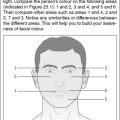Risk-taking or bravado
People take risks on a daily basis, usually without much thought. Driving a car, crossing a road, operating a power tool and climbing a ladder are all potentially risky everyday events. The risk potential of an activity depends on the individual. Running downstairs is dangerous if people are unstable on their feet. Jumping into a swimming pool is risky if a person can’t swim. Most people avoid taking these kinds of risks. Many Water CFs, however, like to push themselves beyond ‘ordinary’ risks to give themselves much greater challenges. As it says in
Ling Shu Chapter 64 ‘The Water type of man has no respect for fear’ (
Wu, 1993).
Why do they need to do this? There are a variety of reasons. Often Water CFs of this kind present a rather still exterior. They may suppress their fear and try not to feel it or they perceive that they never experience fear at all. Often they like to feel challenged or they just enjoy the release of adrenaline which accompanies the risk-taking. They may have suppressed their fear and sense of excitement so effectively that life often feels lack-lustre. Participating in activities that adrenalise them is often the only time they feel any sense of vitality or exhilaration at all.
Evel Knievel, America’s legendary daredevil, is an example of someone who took many risks and showed an extreme lack of fear. He finally retired in 1981 having broken 35 bones, been operated on 15 times and spent three years of his life in hospital. When asked about this, he is reported to have shrugged and said, ‘Hey, you have to pay the price for success.’
Not everyone takes such high-profile risks as Evel Knievel. Others take risks by undertaking activities such as deep sea diving, riding motor bikes, hang gliding, rock climbing, parachuting or snowboarding in order to give themselves an adrenaline rush. Sometimes when questioned, however, these people admit that the risks are not carried out recklessly. They often calculate exactly how ‘safe’ the risk is and know how close to the edge they can go.
A patient who was a Water CF worked as a tree surgeon, which involved a certain amount of danger. In order to ‘relax’ in his spare time he loved to go rock climbing. He told his practitioner, ‘When I climb a rock face I know the dangers. I check and I double check. It’s a calculated risk because I know my equipment and I know the people I climb with and so I know it’s a safe activity.’
Others take needless risks in their day-to-day lives. They may knowingly drive too fast or overtake when it is not safe. One Water CF told his practitioner that he was known for a ‘devil may care’ attitude when it came to crossing the road. He described launching himself in front of a car and expecting it to stop. It always did! He said, ‘I know how big the gap is and I know I can make it. I know exactly how far I have gone and what the situation is. One of these days I might come unstuck but it’s a calculated risk.’
The need to cover up fear can also lead people to do risky things to prove to themselves that they are not afraid. Unlike those who calculate the risks, they love the buzz of taking needless risks. Examples of people who are driven to do this are rich people who shoplift, or people who take recreational drugs when they do not know what constitutes a safe dose. The poet Percy Shelley met his death after insisting on setting sail when all the locals warned him not to.
An acupuncture student who is a Water CF described how, when she worked as a lighting technician, she would focus the lights for large concerts. In order to do this she might be 100 feet above the ground. To move across the ceiling of the large hall she would jump from beam to beam. ‘I’d lean out and get one hand on the next diagonal beam. Once I’d put both hands out I was committed and had to leap across and catch it with my legs. If I’d missed I probably would have fallen to my death.’ She admitted she was terrified of the jump but said, ‘I think I was more scared of not being seen as “one of the boys” than falling to my death, so I carried on doing the job for two years!’
Fearing the worst
At the opposite end of the spectrum to the risk-takers are Water CFs who fantasise about potential threats. The thought of what might happen can grow large in their minds until it becomes almost a reality. They constantly anticipate an impending disaster. They may describe themselves as constantly on the alert, always having their ‘antennae’ out and taking in all the ‘vibes’ around them to ensure there is no danger. If this tendency becomes too strong then the person may start to get ‘panic attacks’, especially if the imbalance in the Water Element starts to affect the Heart across the ke cycle.
To compensate for any impending crisis some Water CFs plan for emergencies. They prepare themselves by learning first aid, knowing the exits in buildings or becoming skilled in martial arts. ‘You never know what might happen.’
A Water CF told his practitioner about his constant paranoia, saying that if people were late by ten minutes he wouldn’t suspect that they’d got stuck in traffic but would imagine they were in a serious road accident. ‘I laugh about it but it’s such a real feeling of paranoia and I feel it several times a day. Paranoia is such a big thing for me but it’s quite hard to admit it. I know the rationale and intellectually I know I’m being stupid but I can’t stop myself having those feelings.’
Because of their ability to think of the worst possibilities Water CFs can be very imaginative. Unfortunately their imagination sometimes gets the better of them and they easily think of worse catastrophes and more horrifying disasters than most people. As one Water CF put it, ‘I imagine very dramatic, huge, dreadful things or somebody will say something to really hurt me and it’s like I will dramatise it in my mind and turn it into something much bigger than it really is.’
Over-caution
Some Water CFs are very careful. For example, they may be financially cautious and ensure that they are properly insured, ‘just in case’. Others may drive slowly or even walk everywhere for fear of accidents (the opposite of the risk-takers who drive too fast). Others may be full of trepidation about going out of the house, travelling for long journeys or some may find it hard to embark on new projects, in case things go wrong.
Some Water CFs are so cautious that they refrain from participating in events that other CFs might think were exciting opportunities. One Water CF missed out on the chance to travel to the United States when she was a teenager. At first she thought it would be exciting to go but as the time to depart drew closer her forebodings grew. Finally she decided to not go after all. ‘I was scared and I wasn’t interested in pushing myself to do something new,’ she told her practitioner.
Being over-cautious can also ensure that Water CFs are vigilant and meticulous in their work and life. For example, a nurse who described herself as a cautious person said that she went through all of the possible difficulties before doing anything. ‘Everything has to be gone through in great detail. For instance, my sterile technique. I think of what could happen if I didn’t do it. So I do it very correctly, almost obsessively.’ The nurse said she did it for herself. ‘I admit I’m scared of what might happen to me, rather than the patients, if things went wrong.’
Water CFs often check things that others wouldn’t notice. This can make them extremely skilled in certain areas of their life. For instance, some people who are good businessmen may be Water CFs who appear to take risks when negotiating a business deal. In reality, however, they may have taken their time to weigh up what might go wrong and have looked at every possible dire consequence that could happen before proceeding to close the deal.





